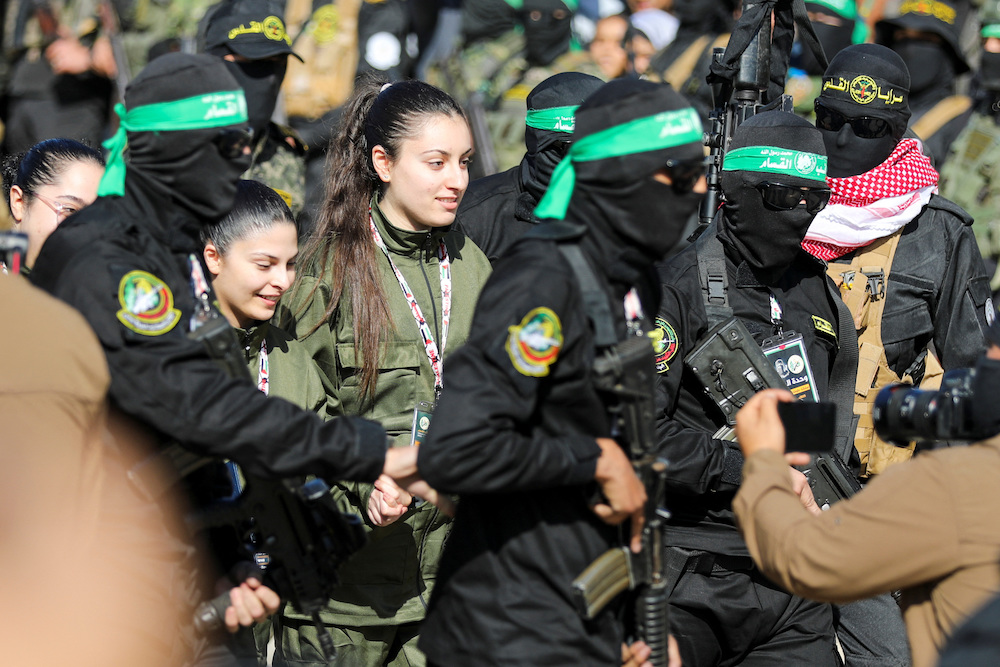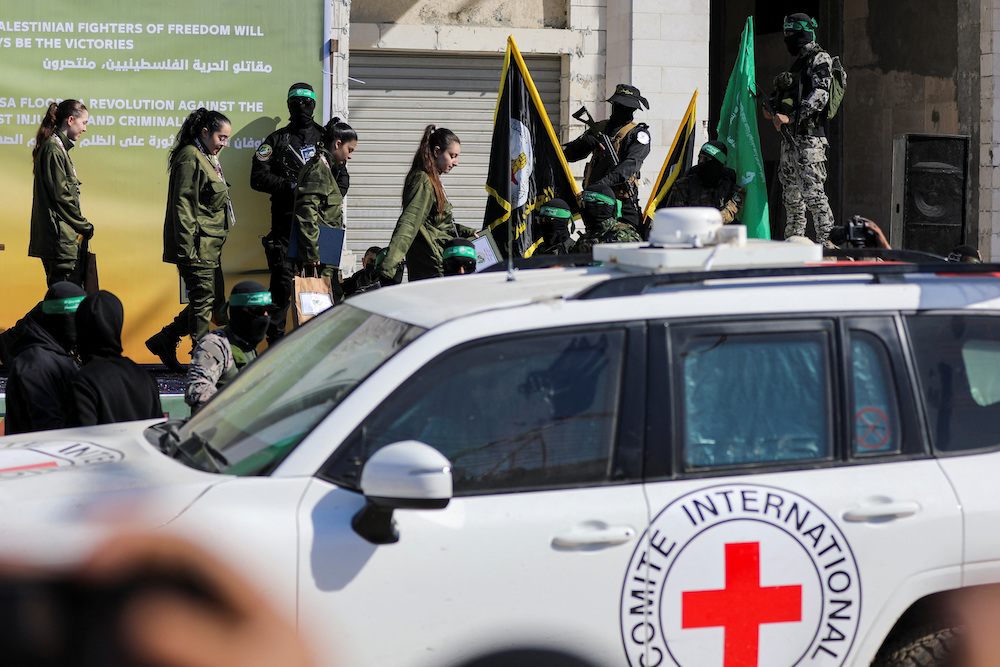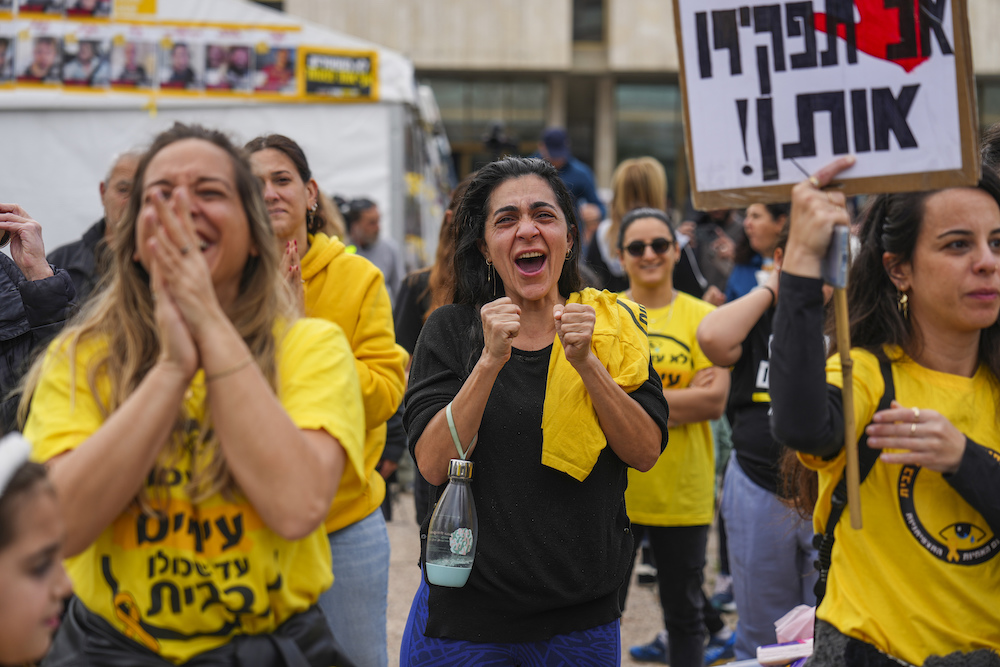NAJAF: The governor of Iraq’s Najaf province resigned on Friday, a day after another governor also quit following demonstrations against living conditions and corruption.
Louai Al-Yasseri resigned from his leadership in Najaf, in central Iraq, a day after the governor of Nasiriyah province in the south quit following the violent suppression of protesters.
Their departures underline the challenges facing war-scarred Iraq and how little has changed despite protests that swept Baghdad and the South two years ago.
Tens of thousands of demonstrators took to the streets to express their anger at corruption, unemployment and crumbling public services, and hundreds lost their lives in protest-related violence.
Yasseri announced at a press conference that he was leaving his post in the holy Shiite city, according to the official Iraqi News Agency.
His resignation follows harsh criticism from prominent Shiite leader Moqtada Sadr, who emerged as kingmaker following legislative elections in October.
Sadr paid a public visit to the municipality in Najaf on Wednesday after “reports of corruption and shortcomings in this institution,” according to the news agency.
“We will work on dismissing the governor of Najaf and replacing him legally,” he said.
On Friday evening, Sadr welcomed the governor’s resignation as a “step in the right direction.”
In the past weeks, sporadic demonstrations have broken out across Najaf and the neighboring province of Diwaniya, as well as in Nasiriyah.
Protesters have decried living conditions and called for job opportunities for young graduates.
Prime Minister Mustafa Al-Kadhemi held a security meeting Wednesday to discuss the protests, where he repeated the need to avoid “the use of force or shoot.”
The following day, the governor of Nasiriyah, Ahmed Ghani Khafaji, announced his resignation after protests in which three people were shot and wounded, according to a medical source.
The 2019 demonstrations petered out after bloody crackdowns and the outbreak of the coronavirus pandemic. More than 600 people were killed and tens of thousands injured throughout the protests.
Kadhemi moved the elections forward to October as a concession to the demonstrators.
But anger gave way to disillusion and the ballot saw record-low turnout.
The movement of Sadr — who once led a militia against American and Iraqi government forces — won 73 out of the assembly’s total 329 seats, the election commission said.
Governor of Iraq’s Najaf resigns after protests
https://arab.news/83swg
Governor of Iraq’s Najaf resigns after protests

- Louai Al-Yasseri resigned from his leadership in Najaf a day after the governor of Nasiriyah province quit
- Tens of thousands of demonstrators took to the streets to express their anger at corruption
Israel blocks Gazans’ return to territory’s north unless civilian woman hostage freed

- ‘Israel will not allow the passage of Gazans to the northern part of the Gaza Strip until the release of civilian Arbel Yehud’
“Israel will not allow the passage of Gazans to the northern part of the Gaza Strip until the release of civilian Arbel Yehud, who was supposed to be released today, is arranged,” Prime Minister Benjamin Netanyahu’s office said.
Israeli military spokesman Rear Admiral Daniel Hagari said, “Hamas did not comply with the agreement on its obligation to return civilian females first.”
Two Hamas sources said that Yehud was “alive and in good health.”
A Hamas source said that she will be “released as part of the third swap set for next Saturday,” February 1.
Earlier on Saturday four Israeli women soldiers held captive in Gaza were released by Hamas and Islamic Jihad.
Hamas frees four Israeli hostages to Red Cross in Gaza

- Israel releases 70 Palestinian prisoners into Egyptian side of the Rafah border crossing
- The hostage-prisoner exchange is part of a fragile ceasefire agreement between Israel and Hamas
GAZA CITY, Palestinian Territories: Hamas militants on Saturday handed over to the Red Cross four Israeli women hostages under a truce deal in the Gaza war that is also expected to see a second group of Palestinian prisoners freed.
An AFP journalist witnessed the handover after the four were presented on a stage at a main square in Gaza City, where dozens of masked, armed militants had gathered earlier.
The Israeli military later confirmed they have received the freed hostages.
Four Red Cross vehicles had arrived ahead of the handover.
The fighters from Hamas and Islamic Jihad, carrying assault rifles and rocket-propelled grenade launchers, gathered in rows, many carrying their groups’ banners and wearing green headbands, as crowds of Gaza residents gathered to watch.
Israel confirmed Friday that it had received a list of the hostages’ names.
Egypt’s state-run Qahera TV meanwhile reported Israel has released 70 Palestinian prisoners into Egypt under the Gaza ceasefire deal. The network said they arrived at the Egyptian side of the Rafah border crossing with the Gaza Strip.
On Saturday, Palestinian sources said Israel is to free 200 Palestinian prisoners in exchange for the hostages.

According to the Israeli Hostage and Missing Families Forum, a campaign group, the women released are Karina Ariev, Daniella Gilboa, Naama Levy — all aged 20 — and Liri Albag, 19.
They had been held captive for more than 15 months, since Hamas’s October 7, 2023 attack on Israel.
Palestinians displaced by the war to southern Gaza should be able to begin returning to the north following Saturday’s releases, Bassem Naim, a member of Hamas’s political bureau based in Qatar, told AFP on Friday.
The truce has also led to a surge of food, fuel, medical and other aid into rubble-strewn Gaza but Israel’s UN ambassador on Friday confirmed that the UN agency for Palestinian refugees, Gaza’s main aid agency, must end all operations in Israel by Thursday.
The hostage-prisoner exchange is part of a fragile ceasefire agreement between Israel and Hamas that took effect last Sunday, and which is intended to pave the way to a permanent end to the war.
Mediators Qatar and the United States announced the agreement days ahead of US President Donald Trump’s inauguration. Trump has since claimed credit for securing the deal after months of fruitless negotiations.
Abu Obeida, spokesman for the Ezzedine Al-Qassam Brigades, Hamas’s armed wing, said on Telegram Friday that “as part of the prisoners’ exchange deal, the Qassam brigades decided to release tomorrow four women soldiers.”
Israeli Prime Minister Benjamin Netanyahu’s office confirmed it had received the names through mediators.
According to Israel’s prison service, some of the Palestinians released will go to Gaza, with the rest returning to the Israeli-occupied West Bank.
The ceasefire agreement should be implemented in three phases, but the last two stages have not yet been finalized.
“The worry and fear that the deal will not be implemented to the end is eating away at all of us,” said Vicky Cohen, the mother of hostage Nimrod Cohen.

In Gaza, families displaced by more than a year of war longed to return home, but many will find only rubble where houses once stood.
“Even if we thought about returning, there is no place for us to put our tents because of the destruction,” Theqra Qasem, a displaced woman, said.
During the first, 42-day phase that began Sunday, 33 hostages Israel believes are still alive should be freed in staggered releases in exchange for around 1,900 Palestinians held in Israeli jails.
Three hostages — Emily Damari, Romi Gonen and Doron Steinbrecher — returned home on the first day of the truce.
Ninety Palestinians, mostly women and minors, were released in exchange.
The deal’s second phase is to see negotiations for a more permanent end to the war, but analysts have warned it risks collapsing because of the deal’s multi-phase nature and deep distrust between Israel and Hamas.
During their October 7, 2023 attack, Hamas militants took 251 hostages, 91 of whom remain in Gaza, including 34 the Israeli military has confirmed are dead.
The attack resulted in the deaths of 1,210 people, mostly civilians, according to an AFP tally based on official Israeli figures.
Israel’s retaliatory response has killed at least 47,283 people in Gaza, a majority civilians, according to the Hamas-run territory’s health ministry, figures which the UN considers reliable.
Under the deal, the withdrawal of Israeli forces from Gaza’s densely populated areas is to allow for the exchanges as well as “the return of the displaced people to their residences,” Qatari Prime Minister Sheikh Mohammed bin Abdulrahman bin Jassim Al-Thani has said.
Almost the entire Gaza population of 2.4 million has been displaced by the war
According to the United Nations, by December 1, nearly 69 percent of buildings in the Gaza Strip had been destroyed or damaged, and the UN Development Programme estimated last year that it could take until 2040 to rebuild all destroyed homes.
Hundreds of truckloads of aid have entered Gaza daily since the ceasefire began, but the UN says “the humanitarian situation remains dire.”

The UN agency for Palestinian refugees, UNRWA, will be effectively barred from operating as of Thursday.
In a letter addressed to United Nations chief Antonio Guterres, Ambassador Danny Danon confirmed: “UNRWA is required to cease its operations in Jerusalem, and evacuate all premises in which it operates in the city, no later than 30 January 2025.”
UNRWA chief Philippe Lazzarini warned on social media platform X on Friday that preventing the agency from operating “might sabotage the Gaza ceasefire, failing once again hopes of people who have gone through unspeakable suffering.”
Lebanon army accuses Israel of ‘procrastination’ in ceasefire withdrawal

BEIRUT: Lebanon’s army accused Israel of procrastinating in withdrawing troops from south Lebanon as required under a ceasefire that ended the war with Hezbollah, a day after Israel said its forces would remain beyond a Sunday deadline for their departure.
The Lebanese army, in a statement issued on Saturday, also urged Lebanese residents to wait before heading into the border region, citing the presence of mines and unexploded Israeli ordnance.
Under the US-brokered agreement, which took effect on Nov. 27, Hezbollah weapons and fighters must be removed from areas south of the Litani River and Israeli troops should withdraw as the Lebanese military deploys into the region, all within a 60-day time frame, meaning by Sunday at 4 a.m. (0200 GMT).
Israeli Prime Minister Benjamin Netanyahu’s office said on Friday the terms had not been fully enforced by the Lebanese state. The White House said a short, temporary ceasefire extension was urgently needed.
The US-backed Lebanese army said it had continued to implement the plan to strengthen its deployment south of the Litani River since the ceasefire came into effect.
“Delays occurred in a number of the phases as a result of procrastination in the withdrawal by the Israeli enemy, which complicated the mission of the army’s deployment,” the statement said. The army “maintains its readiness to complete its deployment as soon as the Israeli enemy withdraws,” it added.
The ceasefire ended more than a year of hostilities which were triggered by the Gaza war and peaked in a major Israeli offensive against the Iran-backed Hezbollah, which uprooted more than a million people in Lebanon.
The Israeli government has not said how much longer its forces might remain in south Lebanon, where the Israeli military says it has been seizing Hezbollah weapons and dismantling infrastructure used by the Shiite armed group.
Hezbollah, which suffered major blows in the war, said on Thursday that any delay of Israel’s withdrawal would be an unacceptable breach of the deal and put the onus on the Lebanese state to act. Hezbollah said the state would have to deal with such a violation “through all means and methods guaranteed by international charters.”
Israel said its campaign against Hezbollah aimed to secure the return home of tens of thousands of people forced by Hezbollah rocket fire to leave their homes in northern Israel.
Yemen’s Houthi rebels unilaterally release 153 war detainees, Red Cross says

- However, the release follows the Houthis detaining another seven Yemeni workers from the United Nations
DUBAI: Yemen’s Houthi rebels unilaterally released 153 war detainees Saturday, the International Committee of the Red Cross said.
The Houthis had signaled Friday night they planned a release of prisoners, part of their efforts to ease tensions after the ceasefire in the Israel-Hamas war in the Gaza Strip.
However, the release follows the Houthis detaining another seven Yemeni workers from the United Nations, sparking anger from the world body.
The Red Cross said it “welcomes this unilateral release as another positive step toward reviving negotiations” over ending the country’s long-running war.
Gaza aid surge having an impact but challenges remain

- In final months before ceasefire, aid convoys were routinely looted by gangs, residents
- In central Gaza, residents say flow of aid has begun to take effect as prices normalize
JERUSALEM: Hundreds of truckloads of aid have entered Gaza since the Israel-Hamas ceasefire began last weekend, but its distribution inside the devastated territory remains an enormous challenge.
The destruction of the infrastructure that previously processed deliveries and the collapse of the structures that used to maintain law and order make the safe delivery of aid to the territory’s 2.4 million people a logistical and security nightmare.
In the final months before the ceasefire, the few aid convoys that managed to reach central and northern Gaza were routinely looted, either by desperate civilians or by criminal gangs.
Over the past week, UN officials have reported “minor incidents of looting” but they say they are hopeful that these will cease once the aid surge has worked its way through.
In Rafah, in the far south of Gaza, an AFP cameraman filmed two aid trucks passing down a dirt road lined with bombed out buildings.
At the first sight of the dust cloud kicked up by the convoy, residents began running after it.
Some jumped onto the truck’s rear platforms and cut through the packaging to reach the food parcels inside.
UN humanitarian coordinator for the Middle East Muhannad Hadi said: “It’s not organized crime. Some kids jump on some trucks trying to take food baskets.
“Hopefully, within a few days, this will all disappear, once the people of Gaza realize that we will have aid enough for everybody.”
central Gaza, residents said the aid surge was beginning to have an effect.
“Prices are affordable now,” said Hani Abu Al-Qambaz, a shopkeeper in Deir el-Balah. For 10 shekels ($2.80), “I can buy a bag of food for my son and I’m happy.”
The Gaza spokesperson of the Fatah movement of Palestinian president Mahmud Abbas said that while the humanitarian situation remained “alarming,” some food items had become available again.
The needs are enormous, though, particularly in the north, and it may take longer for the aid surge to have an impact in all parts of the territory.
In the hunger-stricken makeshift shelters set up in former schools, bombed-out houses and cemeteries, hundreds of thousands lack even plastic sheeting to protect themselves from winter rains and biting winds, aid workers say.
In northern Gaza, where Israel kept up a major operation right up to the eve of the ceasefire, tens of thousands had had no access to deliveries of food or drinking water for weeks before the ceasefire.
With Hamas’s leadership largely eliminated by Israel during the war, Gaza also lacks any political authority for aid agencies to work with.
In recent days, Hamas fighters have begun to resurface on Gaza’s streets. But the authority of the Islamist group which ruled the territory for nearly two decades has been severely dented, and no alternative administration is waiting in the wings.
That problem is likely to get worse over the coming week, as Israeli legislation targeting the lead UN aid agency in Gaza takes effect.
Despite repeated pleas from the international community for a rethink, the UN Relief and Works Agency for Palestine Refugees (UNRWA), which has been coordinating aid deliveries into Gaza for decades, will be effectively barred from operating from Tuesday.
UNRWA spokesman Jonathan Fowler warned the effect would be “catastrophic” as other UN agencies lacked the staff and experience on the ground to replace it.
British Foreign Secretary David Lammy warned last week that the Israeli legislation risked undermining the fledgling ceasefire.
Brussels-based think tank the International Crisis Group said the Israeli legislation amounted to “robbing Gaza’s residents of their most capable aid provider, with no clear alternative.”
Israel claims that a dozen UNRWA employees were involved in the October 2023 attack by Hamas gunmen, which started the Gaza war.
A series of probes, including one led by France’s former foreign minister Catherine Colonna, found some “neutrality related issues” at UNRWA but stressed Israel had not provided evidence for its chief allegations.
















